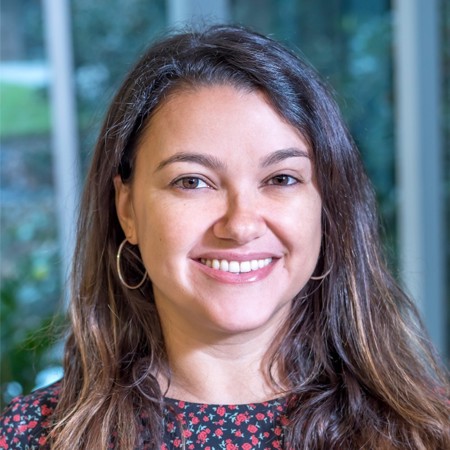Debora Barbosa Vendramini Costa
Assistant Scientist, BioMolecular Science Gateway
Email: barbos22@msu.edu
Bio
The Vendramini-Francescone Lab was established in January of 2023 at the Henry Ford Pancreatic Cancer Center in Detroit and is co-led by husband/wife duo Drs. Débora Barbosa Vendramini Costa and Ralph Francescone. The lab is focused on understanding the tumor microenvironment, the collection of cancerous and non-cancerous cell types and their secreted material, and how they interact at the cellular and molecular levels within a particular tumor. One cancer that has an extremely pronounced microenvironmental reaction is pancreatic cancer, which is among the deadliest cancers. The pancreatic cancer tumor microenvironment is characterized by an intense stromal fibrotic reaction, known as desmoplasia, where there is an activation and expansion of wound healing cells known as fibroblasts, and a large deposition of extracellular matrix and secreted factors. “Islands” of tumor cells reside within this “sea” of activated stroma, which is known to promote tumorigenesis by shielding tumor cells from therapies, inactivating the anti-tumor immune system, and providing nutrients to cancer cells. “R&D lab” is specifically interested in how fibroblasts and their extracellular matrix suppress NK and T-cell responses to tumors, and promote pro-tumoral myeloid cell functions, an evolving area of study. Main projects in the lab focus on how synaptic proteins and signaling pathways regulate pro-tumor functions in CAFs in pancreatic cancer, as well as how CAF derived metabolic products modulate their immunosuppressive capacity. The lab strongly believes that by modulating their pro-tumor functions, fibroblasts can be reverted to a less activated and anti-tumor phenotype, improving therapeutic outcomes for pancreatic cancer patients. The lab utilizes a number of methods to tackle the complex biology behind fibroblasts and the pancreatic cancer tumor microenvironment: 1.) 3D multicellular culturing system, 2.) CRISPR/CRISPRi based methods to modulate protein expression, 3.) immune cell functional assays, 4.) single cell and spatial technologies, in collaboration with other groups, 5.) advanced imaging 6.) genetic and orthotopic mouse models of pancreatic cancer, 7.) patient derived tissue, cells, and interstitial fluid for translational projects. These integrated in vitro, in vivo, and translational approaches allow the team to probe basic biology questions in pancreatic cancer, with the hope of translating these novel findings to the clinic in the future. In our lab, we foster a diverse and inclusive environment, and we believe that science is for everyone.
